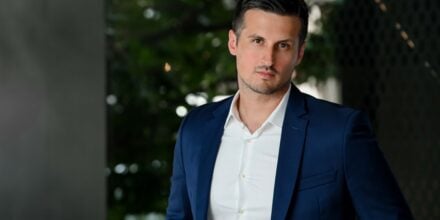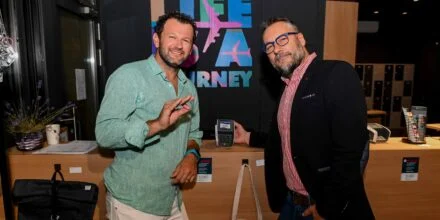Beginnings and the Impact of the Faculty
- When you look back on your study days at the Faculty of Economics at the University of Sarajevo, how much has the knowledge and skills you gained there influenced your later professional path?
- Do you think that the period of studying was important for the development of your entrepreneurial spirit and innovative mindset? Could you explain a bit?
Entrepreneurial Venture and the Development of Monri Payments
- What motivated you to venture into entrepreneurship and start Monri Payments?
For me, every acquisition is a true test—a test of the idea, the team, and the vision. If that formula isn’t strong enough, a larger company will stifle it. If it is… the acquisition becomes rocket fuel. In fintech, this is even more pronounced because the market demands infrastructure, regulatory compliance, and user trust. We passed that test in 2019, when Monri became part of the Payten/ASEE Group. Instead of slowing us down, the acquisition opened doors and allowed us to grow faster. Today, Monri processes hundreds of millions of transactions annually, operates in nine markets, and simultaneously manages its own acquisitions—three to date, with more to follow. Personally, it was the moment I first combined startup agility with the resources of a large company. I learned that true strength lies in that combination. For Monri, it was not the end of the story but the beginning of a new chapter—proof that when an idea and a team have the right fuel and support, they can grow from a local startup into a regional and even global player. And that is something I still see today: companies do not grow alone. Growth comes through partnerships and strategic alliances.
- Monri has had an impressive journey from startup to regional fintech leader. What was the biggest challenge along the way, and what do you consider the company’s greatest achievement?
- In your opinion, what are the key trends in the payments industry that will shape the future?
Over the next two to five years, we anticipate a continued strong momentum in digital transformation within payments. Instant payments will play an increasingly important role—more and more European companies are working to make them a standard and everyday practice for users. One of the most significant initiatives is Wero, a digital wallet developed by the European Payments Initiative (EPI), backed by some of the largest European financial institutions. Their goal is to connect and standardise instant payments across the EU, which could soon result in an interoperable solution across the entire European market.
- You launched the fintech conference Money Motion, now the largest in the region. What does this conference mean to you, and how important is gathering experts and creating a community in the fintech industry?
For me and the other co-founders, Money Motion is much more than a conference—it is a platform that brings together industry leaders, investors, startups, and everyone who wants to contribute to the development of the fintech industry in the region. Through this conference, we aim to create a space for sharing knowledge and experiences, as well as enabling new solutions and ideas to be presented to a wider audience. I believe it is very important to have such a community because the fintech industry grows fast, and only through collaboration and innovation can we build better ecosystems to support future development. This year, we brought together over 2,500 participants, 120 speakers on four stages, and 20 startup teams from 14 countries competing, with winners announced at the end of the program. I should also mention that Amila Pilav-Velić, Vice Dean of the Faculty of Economics, was among the speakers this year. I believe this is just the beginning of a collaboration that will strengthen year by year.
Alumni Community and Advice for Students
- How do you see the role of the Faculty of Economics alumni community in strengthening the connection between the Faculty and its former students?
The alumni community plays a key role in maintaining a lasting connection between the Faculty and its former students, not only through formal events but also through informal meetings and the exchange of experiences. It is essential that the Faculty of Economics is not only a place of education but also a community where long-term relationships, collaborations, and trust are fostered—relationships that begin during studies and endure for years.
- Finally, what advice would you give to current students at the Faculty of Economics who are beginning to think about their first job?
My advice is simple: do what you love. If you currently do not have the opportunity to work in exactly what you are passionate about, find a job that can bring you closer to it or that will provide skills that will help you later. Also, be different. Don’t do things by inertia, don’t be afraid of your ambitions, but stay realistic at the same time. I believe the difference between an average and an exceptional professional often lies in the courage to think independently, stand out, and continuously learn and grow. Finally, don’t let your career be just a series of jobs and titles. Find passion in everything you do, and let it be a wonderful journey that fulfils you (and drives you a little crazy) every day.



